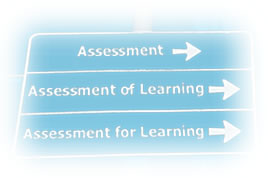

Links - Papers and Articles - Assessment and ITC
Buchanan, T. (2000) The efficacy of a World-Wide Web mediated formative assessment. Journal of Computer Assisted Learning, 16, 193-200. ![]()
The article reports two studies evaluated the effectiveness of a WWW-based formative assessment package used in undergraduate psychology courses
Bull, J. & Stephens, D. (1999). The Use of Question Mark Software for Formative and Summative Assessment in Two Universities. Innovations in Education and Training International 36(2): 128-136. ![]()
This paper describes two methods of introducing computer-assisted assessment (CAA) using Question Mark software within two universities. Students at each university react favourably to each method. The differences between methods is discussed
Burrow, M., Evdorides, H., Hallam, B. & Freer-Hewish, R. (2005). Developing formative assessments for postgraduate students in engineering. European Journal of Engineering Education, 30(2), 255-263.
This paper outlines an approach taken to produce computer-based formative assessments for two modules in a one-year taught MSc programme in Road Management and Engineering
Caroline G. (2005). What is the role for ICT-based assessment in universities? Studies in Higher Education, 30(2), 171-180.
This paper reviews the role of ICT-based assessment in the light of the growing use of virtual learning environments in universities. Issues of validity, efficiency, type of response, and scoring are addressed.
Fletcher, G. H. (2005). Assessing Technology Integration. T H E Journal, 32(9), 2-4. ![]()
This article focuses on the integration of assessment technology with education in the
Harcourt Assessment Introduces Web-Based Elementary Testing Electronic Education Report, 12(9), 4-5.![]()
This article announces the introduction of Stanford Learning First, a Web-based classroom assessment system for grade 3-8 reading and mathematics
Harlen, W. & Deakin Crick, R. (2003) A systematic review of the impact on students and teachers of the use of ICT for assessment of creative and critical thinking skills ( EPPI-Centre Review) In: Research Evidence in Education Library, Issue 2 . London: EPPI-Centre, Social Science Research Unit, Institute of Education. ![]()
The review reported here was prompted by the rapid changes associated with the 'information age'. New technologies have created both the need for education to provide students with what are described as 'higher level thinking skills' and the opportunity to teach and assess these skills.
Jackson, B. (1988)., A Comparison Between Computer-Based and Traditional Assessment Tests, and Their Effects on Pupil Learning and Scoring, School Science Review, 69(249), 809-815.
Discusses the use of a microcomputer in the assessment of middle school pupils in science classes. Describes experimental details, the computer program, test procedures, and results. Concluded that pupils benefit from the immediate feedback provided by computer assessment compared to traditional methods.
McFarlane, A, Williams, JM et al (2000). Assessment and multimedia authoring- a tool for externalising understanding. Journal of Computer Assisted Learning, 16(3), 201 - 212.
This paper reviews the ways in which use of multimedia technology may support improvements in assessment. Drawing on research findings it describes how pupil-produced multimedia documents can reveal aspects of performance that traditional tests may not recognise.
McGuire, L. (2005). Assessment using new technology. Innovations in Education & Teaching International, 42(3), 265-276.
The chapter, reporting on the findings of the initial pilot, will discuss the development of the process, the responses of students and teachers to this new approach, and the implications of the project for developing a more student?centred approach to assessment and learning, and how this might impact on higher education
Ricketts, C. and Wilks, S. J. (2002) Improving Student Performance Through Computer-based Assessment: insights from recent research. Assessment and Evaluation in Higher Education. 27 (5) 475-479. ![]()
One of the benefits claimed for computer-based assessment is that it can improve student performance in summative assessments. Our results suggest that students may be disadvantaged by the introduction of online assessment, unless care is taken with the student-assessment interface
Roos, B. (2005). ICT and formative assessment in the learning society. Academic dissertation, Faculty of Social Sciences, Umea university, ![]()
The thesis focuses on one of the responses to the challenge to the use of information and communication technologies (ICT) as an integral part of the pedagogics of higher education. In particular, can formative assessment be used as an integral support for learning.
Stevens, D. (2001). Use of computer assisted assessment: Benefits to students and staff. Education for Information, 19, 265-275.![]()
In comparing the use of computers with traditional pencil and paper to deliver objective tests for summative assessment, this paper also considers issues of gender differences, objective testing, computer anxiety, and benefits to staff and students
Home | Purposes | Background | Research Plan | Team | Schools | Works | Links